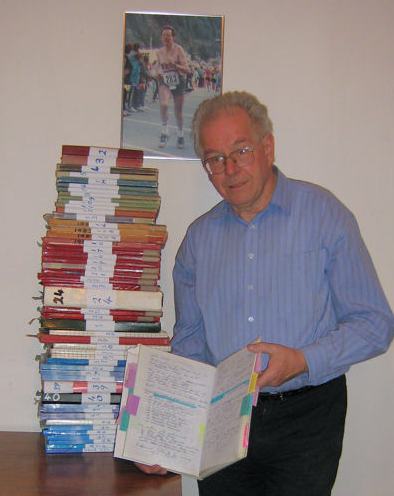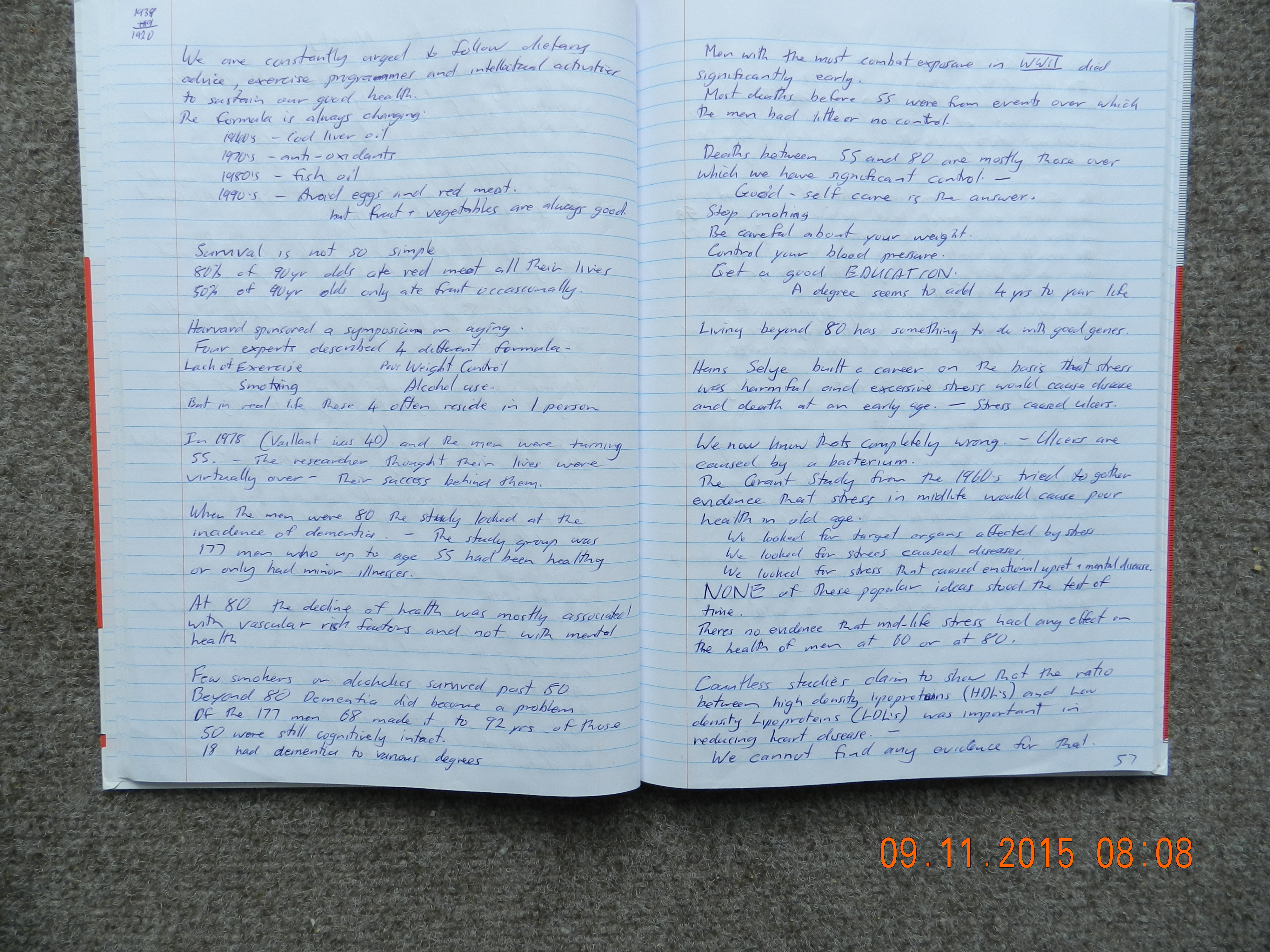Use your journal to help you become the person you can imagine yourself to be. The quality of the things you hope for and strive for are one measure of your own significance. What you achieve and fail to achieve are another measure. In some indirect way those two things are related. If in your journal you can clarify what your hope for and strive for, the things you choose to do may have more purpose and direction.

50 journals written over 30 years. This photo taken in 1998. Note that the diary's I began to write in, became hard covered exercise books.
How to Write a Journal
You can't begin to write a journal until you are ready. You can't learn anything, until you are ready. Readiness is likely to be created when unexpected barriers to what you wanted to do appear. Blocked: maybe surprised and a bit baffled, you begin to search for ways forward. You may need to learn the value of being wrong. None of us can be told, we need to discover our wrongness for ourselves. Welcome your own doubt, and use the energy created by the mystery of not knowing to find out. Doubt is the growing edge of your experience, the unfinished business you need to attend to. Nobody else can do that for you. That's why I like the quote from film maker Waldo Salt, "To search for the truth you must first have lost it." While you are still certain you have all the answers nobody can teach you anything and it's impossible for you to learn anything except new techniques. Once you begin to appreciate that everything you know needs to be tested and re-tested life will become exciting. In the things we all "know and believe to be true" that are in fact wrong, biased, misleading, or pseudo-information, lies the source of our problems as individuals and as a community. If you can "know that" by living through a loss of direction, a loss of faith, a period of doubt and searching, then your knowledge of yourself will develop, and you will be ready to learn what the world offers.
Once the previous paragraph makes sense to you I won't need to give you advice about what to do, you'll have your own driving force that will tell you how to proceed. If you need some help, write notes about what you are doing and about what your are reading, or about discussions you are engaged in. Use your journal to make plans. Draw diagrams, maps, decision trees, relationship maps, mind maps, or sketches to develop your ideas. Write occasional summaries of how the work is going. Writing a summary is like putting a marker in the ground, "this is the stage we are at now." In six months time what you write today may cause you to be a little red faced, but it's also a very valuable lesson. Learning to live with your fallibility is much better than positive thinking. Once you know how much you don't know, the field is wide open for new learning and great progress.

This is a recent journal, started in 2014. These two pages are notes from the book "Triumphs of Experience" by George Vaillant. The topic is growing old and maintaining good health. There are no highlights in this journal (yet), and no tags on the pages either.
[Health Note] Prior to WWII it was well known across Europe how to keep your weight under control. William Banting got the secret from a French doctor, and wrote a booklet about it in 1863. In his "Letter on Corpulence, Addressed to the Public", Banting recommended eating red meat, fish and game, and all vegetables except root vegetables. To be avoided were, sugar, sweet drinks, beer, cakes, bread and milk. Banting, himself, had lost 46 pounds in one year.
After WWI, something went wrong with human diet, and many modern health problems previously unknown became epidemic. After WWII the need to reduce the number of heart attacks was an important, and the plight of President Eisenhower highlighted the need. Strangely, official health recommendations took a wrong turn at this time. The intention was to reduce the saturated fat in the diet, and to reduce the cholesterol levels in the blood. The wrong advice both given and followed, has caused the obesity epidemic to mushroom. The dietary advice the Heart Foundation of New Zealand, and Diabetes New Zealand, and the Nutrition Society of New Zealand and most doctors, is causing metabolic syndrome, type two diabetes, gallstones, high blood pressure, and increased heart attacks. Exactly the opposite of what was intended.
Prof. Richard Feinman's book The world Turned Upside Down: The second Low-Carbohydrate Revolution; is excellent reading. Prof. Feinman says; "Scientifically, the burden of proof is on anybody who would say that it is a good idea for people with diabetes to have any significant amount of carbohydrate." ... and "If you have diabetes or metabolic syndrome, carbohydrate restriction is the default approach, that is the one to try first."
"Every time you see a low-fat item in the supermarket you are looking at an artifact of one of the most bizarre stories in the history of science." ... "When I went ... to find evidence supporting the low-fat recommendations I found none. ... The heart-diet hypothesis was overly simplistic. If it's not a total sham, it's pretty close." ... "The most difficult part of writing this book is understanding or, again at least describing — I don't think it's possible to understand — how the whole field of medical nutrition could be so wrong."[Health Note Ends]
To read about this in more detail, read Nutrition Takes a Wrong Turn.
For me the journal was a principle tool that allowed me greater insight and gave me increased personal confidence. I could have achieved that objective much earlier if somebody had been able to instruct me on some more efficient techniques. Good mentors are few, good mentors for journal writers are rare.
If you still believe that positive thinking and hard work and persistence are the key to life then get on with it. As I said, "You can't begin to write a journal until you are ready. You can't learn anything, until you are ready." In ten years time you might be able to listen to what I'm saying and to see some sense in it. Go well.
